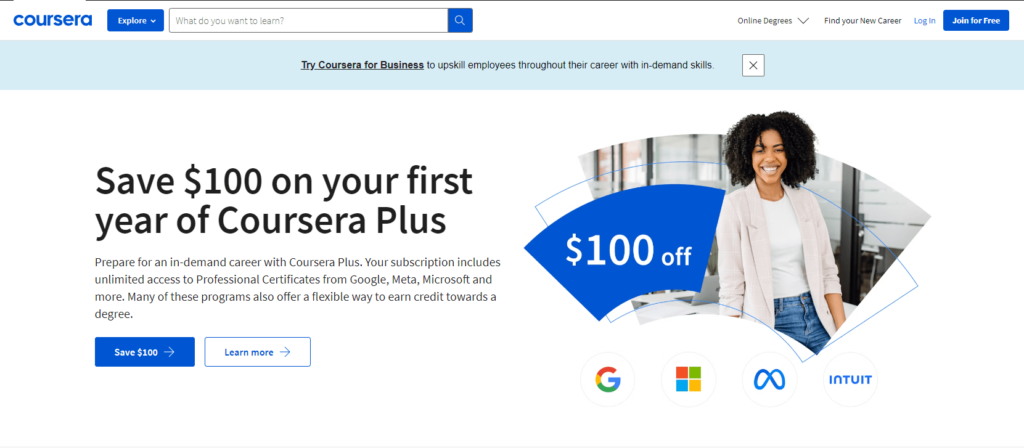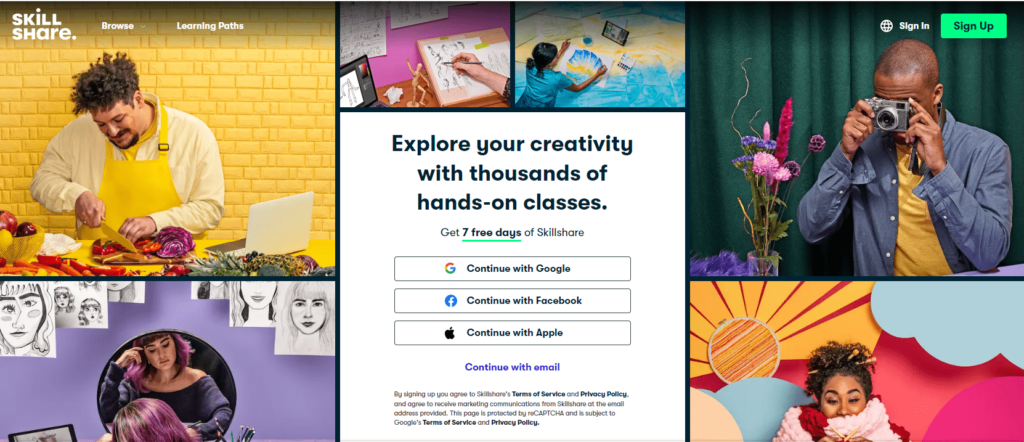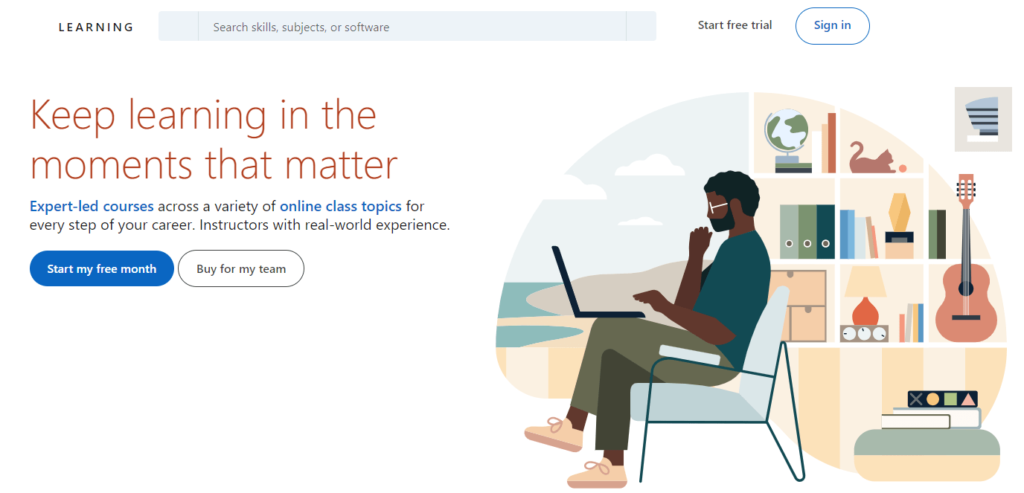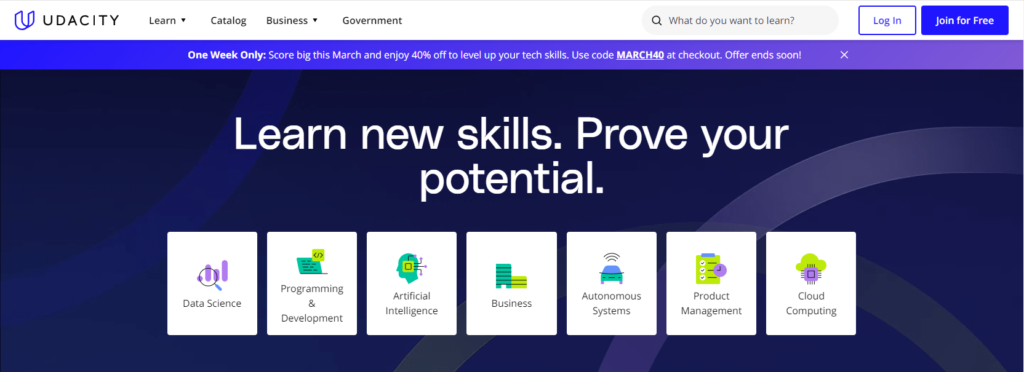If you have ever heard about e-learning and online courses, you have obviously heard about Udemy. Udemy is a platform, which includes various online classes and online degree programs. Udemy is known to be the pioneer of the e-learning industry. It has more than 200.000 courses including free online courses. Being the largest online learning platform with over 64 million users get online certificate programs on Udemy. It is the best place to learn and grow in any sphere you need. Whether you’re looking to earn a degree, acquire a new skill, or simply broaden your horizons, this online learning platform offers different choices to suit every learner’s needs.
It serves as a perfect platform for online course creators to monetize their knowledge globally. You can focus on making your course, while the platform handles things like getting students, managing them, and dealing with the technical stuff of hosting online classes. Although you can make a Udemy course about anything, the topics most people like are technology, coding, SEO, writing, web and graphic design, and skills related to making videos, taking photos, and editing them.
Although Udemy is a well-known and huge learning platform, it has its competitors. There are various Udemy alternatives, so if you are thinking of getting a new skill with the help of an online course or just want to sell your course, you may consider these alternatives as well. Even though Udemy has a lot of visitors, it’s harder to get students for your courses because of all the competition. Another reason to consider alternatives to Udemy is that it’s a general platform with courses on all sorts of topics. Moving to a platform focused on your specific industry could mean you can charge more for your courses and make more money.
In this article, we will cover 5 Udemy competitors or just Udemy alternatives. From specialized online courses with certificates to industry-specific platforms meeting the needs of audiences, we’ll uncover the best alternatives for taking online courses for individual goals and preferences.
Top 5 Udemy Alternatives
1. Coursera

Coursera is one of the leading online learning platforms, offering a vast array of courses, specializations, and degree programs from top universities and institutions around the globe. Launched in 2012 by Stanford University professors Andrew Ng and Daphne Koller, Coursera has since become a go-to destination for individuals seeking quality education in various fields. Only after seven years of creation, did Coursera become one of the leading online college courses contributors.
Today, Coursera has 92 million people signed up to use it. It works together with more than 250 top universities and experts in different fields to provide over 7,000 courses and degree programs. Many of these courses are available for free.
Pros
- High-Quality Content
Courses on Coursera are developed and taught by professors and experts from top universities and institutions globally. This ensures that learners receive high-quality, up-to-date, and rigorous content that is aligned with industry standards and best practices.
- Rich Course Catalogue
Coursera hosts an extensive and diverse catalogue of courses for various subjects, including business, technology, humanities, health sciences, and more. Learners have the opportunity to explore a broad spectrum of topics based on their interests and career aspirations.
- Online Certificate Programs
Upon successful completion of courses, learners can earn certificates for courses focused on specific subjects. These certificates serve as proof of skill mastery, enhancing resumes, validating expertise, and even unlocking career advancement opportunities.
- Affordable Pricing Options
While certain courses on Coursera may require payment, the platform offers various pricing options to accommodate learners with different financial circumstances. So, you can find online college courses at a price that is convenient for you. Although, there are more than 2000 free courses, which you can explore without making any financial commitment.
Cons
- Limited Interactivity
Despite the high-quality content, some courses on Coursera may lack interactivity compared to traditional classroom settings. While instructors may incorporate quizzes, assignments, and discussion forums, the level of engagement can vary depending on the course structure and instructional design.
- Technical Challenges
Like any online platform, Coursera can have technical issues such as website downtime, video playback errors, or connectivity issues. While these disruptions are typically resolved promptly, they can still impact the learning experience for some users and require patience and troubleshooting.
2. Skillshare

Skillshare is another Udemy similar website for innovative online learning platform to focuses primarily on creative courses, making it a go-to destination for individuals looking to improve their artistic skills, explore new hobbies, and unleash their creative potential. Skillshare has grown into a vibrant community of creators and learners, offering a diverse range of classes taught by industry professionals and experts. Skillshare stands as a dynamic platform for improving creativity and getting practical skills in a variety of creative disciplines. With its diverse course offerings, project-based learning approach, and huge community, Skillshare empowers individuals to explore their passions, develop their talents, and connect with others in a supportive and inspiring environment.
Pros
- Creative Courses
Skillshare provides an extensive catalogue of courses spanning a wide range of creative disciplines, including graphic design, illustration, photography, writing, film production, and more. With thousands of classes available, learners have the freedom to explore various subjects and discover their passions.
- Project-Based Learning
One of Skillshare’s standout features is its emphasis on project-based learning. Courses often include hands-on projects and assignments that allow learners to apply newly acquired skills in real-world contexts. This practical approach boosts creativity, confidence, and skill mastery.
- Subscription Model
Skillshare operates on a subscription-based model, offering unlimited access to its entire library of courses for a monthly or annual fee. This pricing structure provides excellent value for money, allowing users to explore as many courses as they desire without any additional costs.
Cons
- Limited Non-Creative Content
While Skillshare excels in offering creative courses, its catalogue may be limited to non-creative subjects such as business, technology, or academic disciplines. Individuals seeking courses outside the realm of creativity may find the selection somewhat lacking.
- Dependency on Subscription
Although we have considered this feature as an advantage, for some users it can be the opposite. Individuals who prefer a pay-per-course pricing structure may find themselves paying for unused months or feeling pressured to consume content to justify the subscription fee.
3. LinkedIn Learning

LinkedIn Learning is an online learning platform designed to foster professional growth and development. Acquired by LinkedIn in 2015, LinkedIn Learning offers a diverse range of courses, tutorials, and learning resources tailored to meet the evolving needs of professionals across various industries. LinkedIn Learning serves as a valuable resource for professionals seeking to expand their skills, advance their careers, and stay competitive in today’s dynamic job market. With its extensive course library, expert-led instruction, personalized learning experience, and seamless integration with LinkedIn, LinkedIn Learning empowers individuals to achieve their professional development goals and thrive in their careers.
Pros
- Expert-Led Instruction
Courses on LinkedIn Learning are led by industry experts, thought leaders, and practitioners renowned in their respective fields. Learners benefit from high-quality instruction, practical insights, and real-world examples, ensuring relevance and applicability to their professional roles.
- Personalized Learning Experience
LinkedIn Learning provides a personalized learning experience for individual preferences, career goals, and skill levels. Through intelligent recommendations and learning paths, users can discover relevant courses, track their progress, and achieve their professional development objectives.
- Integration with LinkedIn
LinkedIn Learning integrates with the LinkedIn platform, allowing users to share their completed courses, certifications, and skills on their LinkedIn profiles. This integration improves visibility, credibility, and professional networking opportunities, facilitating career advancement and job opportunities.
Cons
- Dependency on LinkedIn Platform
Users must have a LinkedIn account to access LinkedIn Learning, which may be a limitation for individuals who prefer to keep their professional and learning activities separate. Dependency on the LinkedIn platform also means that users are subject to LinkedIn’s terms of service and privacy policies.
- Subscription-Based Model
LinkedIn Learning operates on a subscription-based model, requiring users to pay a monthly or annual fee for access to its entire library of courses. While the subscription fee provides unlimited access to content, it may create a financial barrier for individuals on a tight budget or those seeking a pay-per-course pricing structure.
4. edX

edX is a prominent online learning platform founded in 2012 by Harvard University and the Massachusetts Institute of Technology (MIT). It offers a diverse array of courses, MicroMasters programs, Professional Certificate programs, and even full online degrees from leading universities and institutions worldwide. edX’s mission is to provide high-quality education accessible to learners globally, regardless of geographical location or socioeconomic background. With its academic excellence, diverse course offerings, flexible learning formats, and affordable pricing options, edX continues to revolutionize online education and provide opportunities for individuals to enhance their skills, advance their careers, and pursue lifelong learning aspirations.
Pros
- Flexible Learning Formats
edX offers flexible learning formats for different learning styles and preferences. Courses may be non-supervised, allowing learners to study at their own convenience, or instructor-paced, providing structured learning experiences with set start and end dates. Additionally, many courses offer verified certificates to demonstrate mastery of subjects.
- MicroMasters and Professional Certificates
edX offers MicroMasters programs and Professional Certificate programs in collaboration with universities and institutions worldwide. These programs provide learners with specialized skills and certificates that are recognized by employers, helping to advance careers and open new opportunities in various industries.
- Affordable Pricing
While some courses on edX require payment for certificates or credentials, many courses are available for free, allowing learners to access high-quality educational content at no cost.
Cons
- Complexity of Course Structure
Some learners may find the structure of edX courses to be complex or overwhelming, especially if they are new to online learning or unfamiliar with the platform’s interface. Navigating course materials, assignments, and assessments may require time and effort to adapt to the platform’s features.
- Limited Interactivity
Despite offering interactive features such as quizzes, assignments, and discussion forums, some edX courses may lack the same level of interactivity and engagement found in traditional classroom settings. Learners may miss out on the dynamic interactions and collaborative learning experiences offered in face-to-face environments.
5. Udacity

Udacity is providing individuals with the skills needed for success in the rapidly evolving tech industry. Udacity collaborates with leading companies and industry experts to develop courses, nano degree programs, and projects to meet the demands of today’s job market. Udacity stands as a leading online learning platform dedicated to providing individuals with the skills and knowledge needed to succeed in the tech industry.
Pros
- Mentorship and Support
Udacity provides learners with access to mentorship and support from industry professionals and experts. Mentors offer guidance, feedback, and advice throughout the learning journey, helping learners overcome challenges, stay motivated, and achieve their goals.
- Career Services
Udacity offers career services and support to help learners advance their careers and secure employment opportunities. This includes resume reviews, mock interviews, career coaching, and access to a global network of hiring partners seeking qualified candidates with Udacity credentials.
- Industry-Relevant Curriculum
Udacity offers courses and nanodegree programs designed in collaboration with industry partners such as Google, IBM, and Amazon. This ensures that the curriculum is aligned with industry standards and provides learners with practical skills and knowledge that are in high demand in the job market.
Cons
- Cost of Nanodegree Programs
While Udacity offers some free courses, its nanodegree programs typically require payment. The cost of nano degree programs can be relatively high compared to other online learning platforms, which may deter individuals with limited financial resources.
- Emphasis on Tech-Related Fields
Udacity’s focus on technology-related fields such as programming, data science, artificial intelligence, and autonomous systems may limit its appeal to learners interested in other disciplines.
To Sum Up!
Udemy is the leading online learning platform which is used by millions of users who seek to improve their skills and learn new things. It includes a huge number of courses for all the industries. Although there are various udemy like sites that offer the same advantages. Before choosing the right online learning platform you must take into consideration all the possible options and find the right one for you.
In this article, we have discussed the top 5 Udemy alternatives for you, so you do not have to. Think about all the advantages and disadvantages of each platform and find the most convenient one for you.